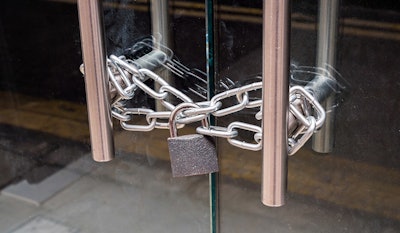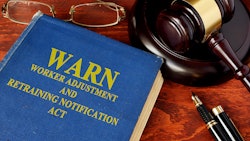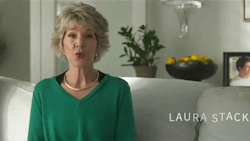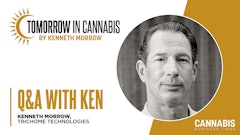
New York City’s enforcement operations geared toward shutting down more than 1,000 unlicensed smoke and vape shops selling unregulated cannabis took a major hit from a judicial order on Oct. 29.
New York Supreme Court for Queens County Justice Kevin J. Kerrigan ruled that a law used by city officials to padlock an unlicensed store violated the business owner’s constitutional rights to due process. Kerrigan also ordered New York City Sheriff Anthony Miranda to remove the seal on A S A 456 Corp., a smoke shop doing business as Cloud Corner, allowing it to reopen.
Specifically, Kerrigan weighed in the case whether the sheriff’s final determination to keep its seal order in place for Cloud Corner was arbitrary and capricious following an Office of Administrative Trials and Hearings (OATH) recommendation that the padlock should be lifted.
“While it is clear that the NYC Administrative Code permits the sheriff to disregard OATH’s determination, there must still be a rational basis for his determination to continue the sealing order,” Kerrigan wrote. “The sheriff failed to provide a rational basis for his final determination here.”
The case stems from when NYC enforcement officials inspected Cloud Corner on Sept. 3 and observed cannabis products for sale without a valid license from the state’s Office of Cannabis Management, according to the lawsuit. After the inspection, the city’s Department of Finance and Sheriff’s Division issued a summons for the immediate order for its closure.
City OATH officer William Ross dismissed the summons on Sept. 10, determining that Miranda’s office conducted the inspection when the store was closed. Ross recommended that the sealing order be lifted, according to the lawsuit.
However, the sheriff’s office issued a final decision on Sept. 16 for the closure order to remain in effect, declining to adopt Ross’ recommendation and instead opting to keep the seal order for one year, according to the lawsuit.
At the heart of Kerrigan’s ruling, however, was whether Cloud Corner was open and operating during normal business hours at the time of the Sept. 3 inspection—not whether the NYC Sheriff’s Office had the authority to padlock the business in the first place.
Specifically, Cloud Corner was one of the targets of Mayor Eric Adams’ enforcement program aimed at shutting down unlicensed shops across NYC’s five boroughs, dubbed Operation Padlock to Protect. The operation began May 7 after the state provided municipalities the regulatory authority to go after businesses that don’t comply with New York’s cannabis laws.
RELATED: Enforcement Powers, Padlocks Part of New York Plan to Dismantle Unregulated Cannabis Sales
Roughly four months into Operation Padlock to Protect, Adams announced Aug. 28 that city officials had destroyed more than 4 tons of cannabis products, worth an estimated $63 million, that they seized from roughly 1,000 storefronts throughout the city.
While city officials could seize unlicensed cannabis previously, they did not have the authority to sidestep judicial review and immediately shut down businesses until the inclusion of the SMOKEOUT Act in New York’s state budget agreement in April.
Liz Garcia, a spokesperson for the mayor, said Tuesday that the city will appeal Kerrigan’s Oct. 29 ruling, The Associated Press reported.
“Illegal smoke shops and their dangerous products endanger young New Yorkers and our quality of life, and we continue to padlock illicit storefronts and protect communities from the health and safety dangers posed by illegal operators,” Garcia said in a statement to the AP.
While NYC Administrative Code Section 7-552 provides the sheriff’s office the authority to inspect and seal a building where unlicensed cannabis sales occur, the code states that “any such regulatory inspection shall only occur during the operating hours of a place of business.”
Ross, the OATH officer who dismissed the summons and recommended the sheriff’s office lift the seal on Cloud Corner, determined Miranda’s inspection occurred outside the company’s normal business hours, according to the lawsuit.
Hurrera Awan, a Cloud Corner employee, testified during the Sept. 10 OATH hearing that the store opens at 1 p.m. and closes at midnight daily, despite the business’s hours of operations listed as 10 a.m. to midnight on Google, according to the lawsuit.
During the Sept. 3 inspection, an undercover officer knocked on Cloud Corner’s door at approximately 12:30 p.m. and asked Awan if the shop sold cigarettes, according to the lawsuit. After Awan informed the officer that the store was closed, the officer indicated he could not hear the employee and proceeded to lift a gate and enter the premises, according to the lawsuit.
While Awan conceded during that OATH hearing that the unregulated cannabis products seized by the sheriff’s office were offered for sale during Cloud Corner’s normal business hours, he indicated that the hours listed on Google were not input by store ownership and that the officer’s inspection happened when the store was closed, according to the lawsuit. The OATH officer credited Awan’s testimony in dismissing the summons.
Despite recognizing the sheriff’s office’s authority to ignore the OATH recommendation, Kerrigan ruled that Miranda’s decision to keep the sealing order in effect was arbitrary and capricious based on the hearing findings that Google listings are not under the control of the business owners.
“The statutory scheme makes it clear, to this court, that unlicensed activity cannot be established where the inspection is done in violation of Section 7-552, or where the business is closed,” Kerrigan wrote. “Since [Cloud Corner] established that the business was closed at the time of the inspection, there was no proof of unlicensed activity and the summons was dismissed.”
Furthermore, Kerrigan determined that since Cloud Corner was not found to have engaged in illegal or unlicensed activity under the NYC Administrative Code, the sheriff’s closure of its business was “a clear violation of due process under the law.”
Kerrigan did acknowledge that Awan’s testimony indicated that Cloud Corner does sell unregulated cannabis during normal business hours.
“This decision should not be interpreted to condone such unlicensed activity,” the justice wrote. “However, summarily shuttering a business for one year, despite the fact that it was exonerated from allegations of illegal activity, stands against the cornerstone of American democracy and procedural due process.”



























